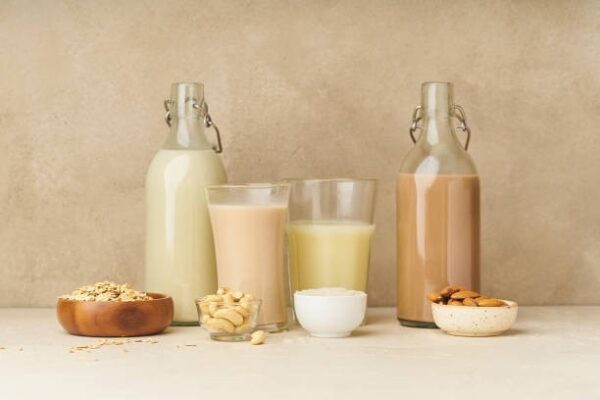
Over the past four years, the plant based milk industry has grown 7% to a market valued at USD 12 bn. An increasing number of people choose oat milk, almond milk, and soy milk over conventional cow’s milk. There are several reasons why one may prefer plant-based milk over cow’s milk, and here are a few:
- Allergies:
Lactose intolerance:
70% of the world’s population is lactose intolerant; therefore, there is an increasing demand for dairy substitutes. People with lactose allergies cannot digest cow’s milk and its derived products. They may risk losing vital nourishment if they cannot find an alternative to dairy.
Gluten intolerance:
A severe form of gluten allergy, called celiac disease, affects 1% of the population. Although natural cow’s milk is free of gluten, additives included during the milk processing make it unsuitable for many people who cannot digest gluten. A healthy alternative for them is to try milk derived from oats, almonds, soy, and chia.
- Health:
Cardiovascular health: Plant-based milk is excellent for the heart. For instance, oat milk has special fibers (beta-glucan) combined with cholesterol in the gut, thus lowering blood cholesterol levels.
Improved metabolism: Alternative milk tends to have high levels of Vitamin B12 and B2, along with high phosphorus levels. In combination, they help improve the efficiency with which your body can convert food to energy.
- Weight Loss:
Low calories: Apart from oat milk, all other plant-based milk have lower calories than cow’s milk. For instance, one cup of whole fat cow’s milk adds up to 150 calories, whereas 1 cup of almond milk only contains 40 calories.
Low fat: Plant-based milk is generally low in fat and contains only 25-60% of the fat found in the same volume of cow’s milk.
High Protein: Plant-based milk can provide as much or more protein than cattle milk. One cup of oat milk can meet 6% of your daily protein requirement. Protein takes longer to digest, therefore leaving you feeling satiated for longer. A high protein diet can help you curb your appetite and mindless snacking.
Riboflavin: Plant-based milk is a rich source of Vitamin B complex, including B2 riboflavin. It promotes a healthy metabolism. Additionally, it is an antioxidant and flushes free radicals out of your system.
- Cruelty-free:
Did you know that cows are bred in captivity to produce and export 843 mn tons of milk worldwide? In most farms, cattle are crowded into unhygienic living conditions and given supplementary food to increase their milk production.
Calves are separated from mothers, older female cows, and young male calves are sent to slaughterhouses for meat processing. Several people made a conscious shift to plant-based milk to reduce the global demand for cow’s milk and thus discourage the growth of inhumane cattle farms.
- Climate Conscious:
Dairy farming is one of the largest emitters of methane, a highly potent greenhouse gas (GHG). It is estimated that the dairy industry accounts for almost 3.4% of the world’s total carbon footprint and that in a decade, there was an 18% increase in GHG emissions by the industry. People, therefore, choose plant-based milk, as its production is far more environmentally friendly and sustainable.
In conclusion
Many people are making a conscious shift to plant-based milk as it gives them the benefit of good health, nutrition, and the joy of contributing to a more sustainable world. So, if you haven’t yet, it may be time for you to jump on to the bandwagon too!



